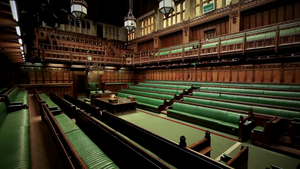
Back Britse Laerhuis Afrikaans مجلس عموم المملكة المتحدة Arabic مجلس العموم البريطانى ARZ Cámara de los Comunes del Reinu Xuníu AST Böyük Britaniya İcmalar palatası Azerbaijani Камара на общините на Великобритания Bulgarian Ti ar C'humunioù (Rouantelezh-Unanet) Breton Cambra dels Comuns del Regne Unit Catalan Dolní sněmovna Spojeného království Czech Tŷ'r Cyffredin (Y Deyrnas Unedig) Welsh
The Honourable the Commons of the United Kingdom of Great Britain and Northern Ireland in Parliament assembled | |
|---|---|
| 58th UK Parliament | |
 Logo used to represent the House of Commons | |
 Flag of the House of Commons | |
| Type | |
| Type | |
| Leadership | |
Sir Lindsay Hoyle since 4 November 2019 | |
Dame Eleanor Laing, Conservative since 8 January 2020 | |
Rishi Sunak, Conservative since 25 October 2022 | |
Penny Mordaunt, Conservative since 6 September 2022 | |
Simon Hart, Conservative since 25 October 2022 | |
Sir Keir Starmer, Labour since 4 April 2020 | |
Lucy Powell, Labour since 4 September 2023 | |
Sir Alan Campbell, Labour since 9 May 2021 | |
| Structure | |
| Seats | 650 |
 | |
Political groups | HM Government
|
Length of term | Up to five years[c] |
| Elections | |
| First-past-the-post | |
Last election | 12 December 2019 |
Next election | No later than 28 January 2025 |
| Redistricting | Recommendations by the boundary commissions; confirmation by King-in-Council. |
| Meeting place | |
 | |
| House of Commons chamber Palace of Westminster City of Westminster London, England United Kingdom | |
| Website | |
| www | |
| This article is part of a series on the |
| House of Commons of the United Kingdom |
|---|
 |
The House of Commons[d] is the lower house of the Parliament of the United Kingdom. Like the upper house, the House of Lords, it meets in the Palace of Westminster in London, England. The House of Commons is an elected body consisting of 650 members known as members of Parliament (MPs). MPs are elected to represent constituencies by the first-past-the-post system and hold their seats until Parliament is dissolved.
The House of Commons of England began to evolve in the 13th and 14th centuries. In 1707 it became the House of Commons of Great Britain after the political union with Scotland, and from 1801 it also became the House of Commons for Ireland after the political union of Great Britain and Ireland. In 1922, the body became the House of Commons of the United Kingdom of Great Britain and Northern Ireland after the independence of the Irish Free State. Under the Parliament Acts 1911 and 1949, the Lords' power to reject legislation was reduced to a delaying power. The government is solely responsible to the House of Commons and the prime minister stays in office only as long as they retain the confidence of a majority of the Commons.
Cite error: There are <ref group=lower-alpha> tags or {{efn}} templates on this page, but the references will not show without a {{reflist|group=lower-alpha}} template or {{notelist}} template (see the help page).
- ^ Forsyth, Christopher (1 January 2011). "The definition of Parliament after Jackson: Can the life of Parliament be extended under the Parliament Acts 1911 and 1949?". International Journal of Constitutional Law. 9 (1). Oxford University Press: 132–143. doi:10.1093/icon/mor019. OCLC 5113464158. S2CID 144226994.
- ^ Foreign Affairs Committee; Gapes, Mike (2008). Overseas Territories: Seventh Report of Session 2007–08. Vol. 2. London: The Stationery Office. p. 280. ISBN 978-0-215-52150-7. OCLC 940357336.
© MMXXIII Rich X Search. We shall prevail. All rights reserved. Rich X Search